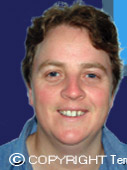











 |
|

|
|
Sierra P2002 |
|
Introducing the latest TECNAM design, the P2002 SIERRA.
The SIERRA has been designed as the successor to the GOLF. With
over 900 new parts, the new SIERRA low wing aircraft has been
improved upon in every respect. |
|
 |
|
The
P2002 is a twin seat, single engine light aircraft with a
cantilever low wing and tricycle landing gear. Type Certificated
according to JAR-VLA Regulations, as well as Ultralight/Microlight.
The main uses of the P2002 in both the versions are in the
recreational and educational field, in the sport, tourist and
aerial work flights.
|
|
WING
The wing presents a tapered, no sweep, plan form, with NACA 63A-
wing sections. The slotted flaps extend on 45% of the wing span.
The ailerons are Frise type.
The RH and LH wings join together by means of the carry-through
beam integrated in the fuselage truss framework.
The wing structure is made up of a conventional single spar torque
box. Two bolts connect each wing to the carry-through beam. Two
other fittings, in the leading edge area and connected with the
secondary spar, serve mainly to carry the torsion loads.
All structural parts are made of aluminium light alloy (2024-T3 and
6061-T6), except for tips and fairings which are in fibreglass.
FUSELAGE
The fuselage structure consists of a steel truss framework in the
cabin area, capable of providing satisfactory protection in case
of crash-landing, and a light alloy semi-monocoque cone for the
aft section.
The engine mount and nose wheel fittings are directly connected to
the steel truss framework through the fireproof bulkhead. The
empennage fittings are installed in the last two frames of the
tail cone.
|
ACCOMMODATION.
The wide cabin features two side by side seats, which can be
adjusted via sliding rail stops. A baggage compartment is located
behind the seats.
Cabin access is through a sliding canopy that opens toward the
rear, overlapping the aft cabin fairing.
A large panel allows the space for the standard flight
instrumentation and for a wide variety of Com-Nav equipments.
Flight controls are of conventional dual stick and dual rudder
pedals design. Flap and longitudinal trim controls are
electrically operated with position indicators located on the
instrument panel.
EMPENNAGE
The horizontal trimmable tail plane is all-moving type, which
allows a high control authority and a better stick free stability.
The vertical tail is conventional fin and rudder type.
Both horizontal and vertical tail plane structures are aluminium
light alloy (2024-T3 and 6061-T6), except tips which are in
fibreglass.
|
LANDING GEAR
The main landing gear is realized with simple steel spring-leaves,
5.00x5 wheel and tires, disc brakes, renowned for their
operational record of effectiveness and safety. The nose gear
features a steerable wheel with a rubber doughnut shock absorber.
POWER PLANT
The engine is the last FAR 33 FAA Type certified version of the
73.5 kW ROTAX 912S, 4 stroke, 4 cylinders horizontally opposed,
driving a certified two blade fixed pitch Hoffmann propeller, or
the Ultralight version of the same motor.
The fuel is stored in two integral fuel tanks, one in each wing
leading edge (total capacity 100 lt.). Fuel supply is via an
engine-driven mechanical pump and an additional electrical fuel
pump.
The electrical system draws power from a 280 W engine-driven
alternator, equipped with an electronic rectifier/regulator and a
12 V, 18 Amp battery.
|
|
|







